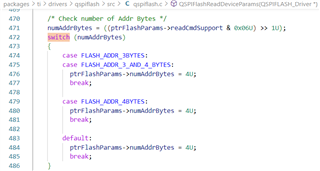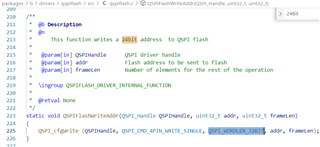Other Parts Discussed in Thread: MMWAVEICBOOST
I have connected FLASH MX25L25645G to my AWR1843. I want to access whole 64MB (512Mb) of flash. In am able to access only 16MB out of 64MB. After the RCA I found out that it is because of the 3 Byte Addressing mode.
In order to enable 4 Byte addressing mode I tried the following methods.
1. I tried to enable the 4Byte addressing mode using EN4B(0xB7).
2. Tried setting the numAddrBytes to 4U by Default.

3. change the QSPI_WORDLEN_24BIT to QSPI_WORDLEN_32BIT

Can you please suggest me the way I can be able to enable the 4Byte addressing mode or any other way to access the 64MB Flash.
Note:
SDK Version: mmwave_sdk_03_05_00_04
I have build the driver after making all the above changes through the makefiles (make drv).

